Chesapeake Bay receives a C in 2017!
 The 2017 Chesapeake Bay Report Card was released on June 15th, 2018 at the Hyatt House on the Wharf in downtown Washington, D.C. Press, partners, and the public gathered to hear about the health of the Chesapeake Bay and the stories that were highlighted in this years report card. This year major stories included a 'statistically significant' positive trend in Chesapeake Bay health and the resilience of aquatic grasses in the Bay. Want to know more? Dig into the data here!
The 2017 Chesapeake Bay Report Card was released on June 15th, 2018 at the Hyatt House on the Wharf in downtown Washington, D.C. Press, partners, and the public gathered to hear about the health of the Chesapeake Bay and the stories that were highlighted in this years report card. This year major stories included a 'statistically significant' positive trend in Chesapeake Bay health and the resilience of aquatic grasses in the Bay. Want to know more? Dig into the data here!
Chesapeake Bay Report Card 2018 released!

AN released the 2018 Chesapeake Bay Report, giving the Chesapeake a C grade. Due to heavy rainfall in the past year we saw many indicators stay steady or decline in their score. Over the past decade we have noticed a significant improving trend in the Chesapeake Bay. This trend will continue to improve with the collective effort of the people who live here. More information about indicators and grades is available at ecoreportcard.org.
2019 Chesapeake Bay and Watershed Report Card
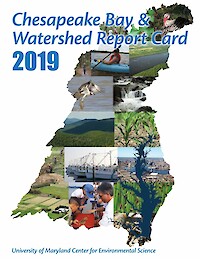
For the first time, Chesapeake Bay watershed health was scored as part of the report card and scored a B-. The Chesapeake Bay health score dropped from a grade of C to a C-. In addition to ecological indicators, societal indicators were included for the first time.
November: IAN Report Card workshop at the Chesapeake Watershed Forum

This year's Chesapeake Watershed Forum, hosted by the Alliance for the Chesapeake Bay in West Virginia, will feature a workshop led by IAN staff entitled: "Expanding the Chesapeake Bay Report Card."
Chesapeake Bay Watershed Report Card released!
On May 19th, Chesapeake Bay Watershed Report Card was released during a virtual event. Speakers included Dr. Peter Goodwin, Dr. Bill Dennison, Secretary Ben Grumbles, Secretary Matthew J. Strickler, Ann Swanson, Kate Fritz, Jake Reilly, and Secretary Jeannie Haddaway-Riccio. For the first time, Chesapeake Bay watershed health was scored as part of the report card and scored a B- grade. The Chesapeake Bay health score decreased in 2019, dropping from a grade of C to a C-. In addition to ecological indicators, societal indicators were included for the first time. There were over 90 people watching the live webinar event, and 95 million people were reached through traditional and social media. You can view the full report card document here or visit the report card website here.
The Chesapeake Bay Report Card will include new watershed indicators
As part of the revisions to the Chesapeake Bay Report Card this year, IAN hosted a two-hour webinar for stakeholders to consider the proposed indicators that were in development. The workshop was very well-attended by stakeholders from all over the watershed. Through a lively discussion by video conference, and through the use of the chat function, stakeholders generated great feedback and recommendations on how to proceed. This year, the Chesapeake Bay Report Card will unveil additional indicators that assess the health of the watershed, for the first time in its 14-year history. The report card will be released on May 19. Stay tuned!
Revamping the Chesapeake Bay Report Card
From January 7–8, IAN staff traveled to Harrisburg, PA for a workshop to expand the Chesapeake Bay Report Card. Bill, Caroline, Alex, Sky, and Vanessa facilitated and presented at the workshop. The workshop brought together stakeholders to discuss how to include watershed and socioeconomic data in future report cards. Watershed reporting regions were developed and numerous new indicators were discussed. Moving forward, there will be another workshop held in Virginia this spring to further refine the indicators and data analysis methodology.
2018 Chesapeake Bay Report Card
We compiled and created the annual health score for the Chesapeake Bay. This year's report card added indicators as well as scoring the Bay itself, which received a score of 45% (C) in 2018.
Now available: 2020 Chesapeake Bay and Watershed Report Card
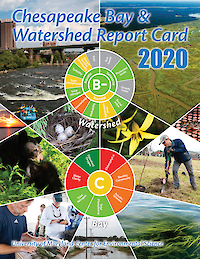
The 2020 Chesapeake Bay and Watershed Report Card was released on June 22 in person at Sandy Point State Park. The Bay itself received a moderate score (C), a slight increase from 2019. The Chesapeake Watershed was scored separately, including several new socioeconomic indicators, and received a good score (B-). The new indicators included protected lands, and the socio-economic indicators stewardship, walkability, and heat vulnerability index. The new socio-economic indicators attempt to address the question of equity in the Chesapeake Bay Watershed. Underprivileged and underserved communities are more vulnerable to adverse environmental impacts. We are committed to improving Chesapeake Bay environmental and socio-economic health. It is vital to incorporate equity and justice into environmental management.
Despite the tumult of 2020, the essential work of monitoring the Chesapeake Bay and Watershed continued. We are grateful to our partners and staff whose hard work made this report card possible. Visit ecoreportcard.org to view the full report card and learn more about the indicators and process.
Three IAN report cards received Hermes Creative Award
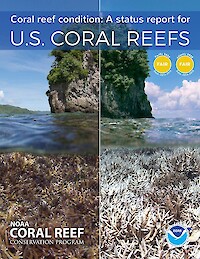
"The Hermes award is an international awards competition of approximately 6,000 entries for creative professionals involved in the concept, writing, and design of traditional and emerging media. Hermes Creative Awards recognizes outstanding work in the industry while promoting the philanthropic nature of marketing and communication professionals. The Platinum award is the highest-level designation, and the three UMCES campaigns reached over 700 million people in watershed communities." (Associated Press)
The three projects highlighted by this award are the Coral Reef Condition Status Reports, the 2019 Chesapeake Bay Watershed Report Card, and the Western Lake Erie 1st Report Card. We are proud to share this award with our partners at Yes& Agency, and are deeply grateful to all of our staff who made these projects possible.
2020 Chesapeake Bay Report Card
The Cheapeake Bay itself received a moderate score (C), a slight increase from 2019. The Chesapeake Watershed was scored separately, including several new socioeconomic indicators, and received a good score (B-). The new socio-economic indicators attempt to address the question of equity in the Chesapeake Bay Watershed. As part of this effort, a MEES course started work on developing a Chesapeake Environmental Justice Index framework. Environmental justice requires providing fair treatment and meaningful involvement of all people, regardless of race, color, national origin, or income, with respect to the environment.
The Chesapeake Bay & Watershed were in moderate condition in 2021
On June 6, we released the 2021 Chesapeake Bay & Watershed Report Card. The event was held in-person at the Institute of Marine and Environmental Technology in downtown Baltimore, MD. A small crowd of Maryland government officials, local sustainability leaders, Congress members, and interested scientists gathered to hear the results of this year's report card. The 2021 Chesapeake Bay & Watershed Report Card is unique because it includes, for the first time, economic data in its suite of indicators. Economic information is vital to understanding the relationship between humanity and the environment in the Chesapeake Bay region.
Similarly, we are committed to better representing environmental justice in our annual Chesapeake Bay and Watershed Report Cards. In addition to the social vulnerability index, heat vulnerability index, and walkability indicators, this year’s report card also includes two new economic indicators with environmental justice implications: income inequality and housing affordability.
The full report card can be viewed here.
Coming Soon: 2022 Chesapeake Bay Report Card
We are getting ready to release our yearly Chesapeake Bay and Watershed Report Card on Tuesday, June 6th at the Washington Sailing Marina in Alexandria, VA. Please join us in person or through Facebook Live. We are eager to share new indicators, update the community on the current condition of the Bay and watershed, and hold a listening session with stakeholders following the release. In addition, we will be holding three more stakeholder listening sessions in June: on June 8th at the Leonardtown Wharf Park, St. Mary’s County, MD, on June 14th at the Potomac Science Center in Woodbridge, VA, and on June 21st at the Canal Place Heritage Park, Cumberland, MD.
2022 Chesapeake Bay and Watershed Report Card Released
The highly anticipated release of our 2022 Chesapeake Bay and Watershed Report Card brought forth crucial insights into the health of this iconic ecosystem. The 16th annual release occurred on June 6th at the Washington Sailing Marina in Alexandria, Virginia. It was attended by representatives from Maryland, DC, and Virginia, along with environmental groups working within the Chesapeake Bay watershed. Our comprehensive assessment, based on rigorous scientific data and analysis, offers a holistic view of the Bay's ecological condition and the watershed’s ecological, economic, and societal conditions. In 2022, the Chesapeake Bay scored 51% (C) with a significantly improving trend, and the Chesapeake Bay watershed scored 52% (C). This was also the first year we evaluated the Environmental Justice Index; however, it was not included in the overall health score. To learn more about the scores, please visit ecoreportcard.org. This report card serves as a reminder of the ongoing work needed to restore and protect the Chesapeake Bay and surrounding watershed, encouraging collective action for a sustainable future.
Coming soon: 2024 Chesapeake Bay & Watershed Report Card

Our annual Chesapeake Bay & Watershed Report Card will be released on Tuesday, July 9th from 10am-12pm ET at the Susquehanna River Basin Commission in Harrisburg, PA. This will be our first-ever release event of this report card in Pennsylvania! The event will also be live-streamed on our Youtube page via a Zoom webinar. To attend, please RSVP here.
Highlighting Chesapeake Bay science through our annual report card
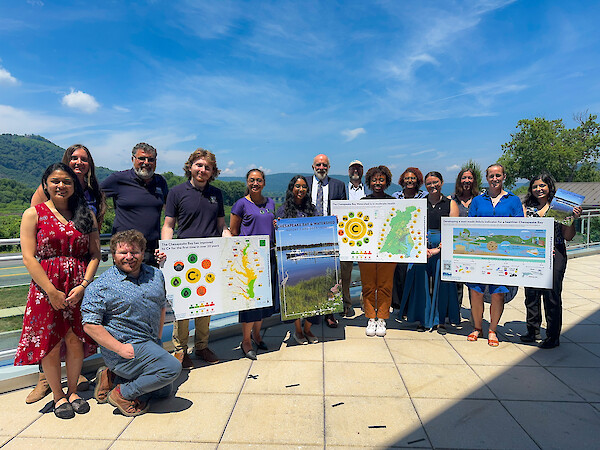
On July 9th, the 2023/2024 Chesapeake Bay and Watershed Report Card debuted in Harrisburg, PA at the Susquehanna River Basin Commission, marking the first-ever release in Pennsylvania. The press conference featured Pennsylvania Governor Josh Shapiro, three Maryland department secretaries (Josh Kurtz, Serena McIlwain, and Kevin Atticks), three Pennsylvania department secretaries (Cindy Dunn, Jessica Shirley, and Russ Redding), and U.S. EPA Region 3 Administrator Adam Ortiz. The event highlighted progress in improving the Chesapeake Bay score and the collaboration needed to sustain these efforts. The report card included stories on the Eastern Shore's agricultural land use and plans for a man-made debris indicator. A supplemental newsletter on man-made debris and current UMCES research was also released.
Group Model Building for a Healthier Chesapeake Bay
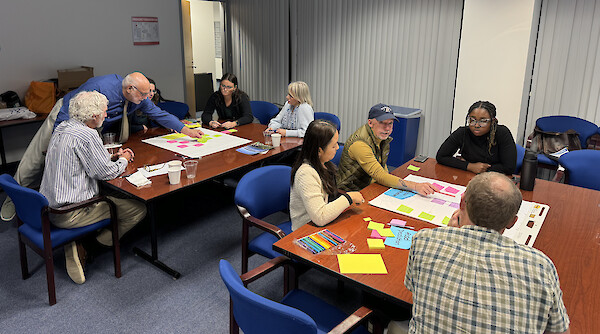
On October 9th, COAST Card’s partners from Norway, Dr. Pål Davidsen and Dr. Aklilu Tadesse, facilitated a system dynamics modeling (SDM) workshop with key stakeholders involved in Chesapeake Bay research and restoration. The workshop began with presentations about the COAST Card project, the Chesapeake Assessment Scenario Tool (CAST), and the process of SDM. This was then followed by an engagement activity where stakeholders identified important ecosystem services, and their responses were grouped into categories such as climate resilience and food production. These categories were assigned to groups of participants tasked with creating causal loop diagrams in a group model-building activity by specifying supporting ecosystem services and underlying threats. The workshop concluded with presentations about key findings from the project’s Potomac listening sessions and the social network analysis of the Potomac watershed. It was a very productive and informative meeting overall, and the results from the group modeling activity will be used to help progress the Chesapeake Bay and Watershed Report Card.
Join us for a Community Listening Session!
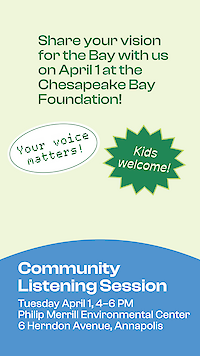
We want to hear from YOU! The Chesapeake Bay is more than just water; it’s the home, livelihood, and culture of many communities. We’re expanding the Chesapeake Bay Report Card to reflect community perspectives and concerns, socio-environmental justice, and local resilience. This is an opportunity to share your perspectives, connect with others, and help drive meaningful change.
Join us for a family-friendly event with great conversations and light refreshments on April 1st, 2025, anytime from 4-6 PM at the Chesapeake Bay Foundation headquarters in Annapolis. Your voice matters! Please register to attend here.
We are also seeking to connect with organizations working on Chesapeake Bay watershed issues from 12-3 PM on April 1st, so if you are interested in participating, please contact Vanessa Vargas-Nguyen at vvargas@umces.edu. We look forward to seeing you!
Shaping the future of the Chesapeake Bay Report Card
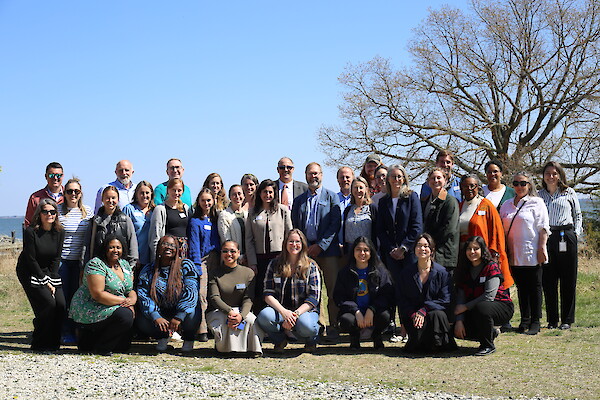
IAN partnered with the Chesapeake Bay Foundation (CBF) to host a workshop on April 1 at CBF’s Philip Merrill Environmental Center in Annapolis. The event brought together environmental professionals from across the region to inform the development of the annual Chesapeake Bay and Watershed Report Card (CBWRC). After a networking lunch, participants heard remarks from Dr. Bill Dennison, Professor of Marine Science and Vice President for Science Application at the University of Maryland Center for Environmental Science, and Hilary Falk, President and CEO of CBF. Attendees then broke into groups to discuss the role of watershed report cards, their alignment with ongoing work, and potential new indicators. The workshop concluded with a collaborative stakeholder mapping activity, offering valuable insights to guide future CBWRC efforts and improve communication around the region’s socio-environmental health. Moving forward, our goal is to continue engaging stakeholders to help create a CBWRC that accurately reflects the health of the environment and the communities that depend on it.
Fun at the 2025 IMET Open House
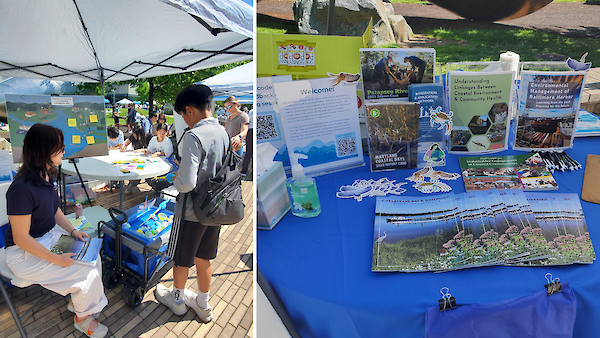
On Saturday, May 10th, IAN joined IMET at their annual open house, this year in partnership with Baltimore Public Works's Big Truck Day. The event was hosted across IMET's parking lot and Pierce's Park, and featured trash, recycling, and construction trucks, education about public works, hands-on STEM activities, microscopes, touch tanks, and more. The IAN team surveyed attendees on their concerns and hopes about the Chesapeake Bay, and educated through a Fishing for Chesapeake Bay Facts game. It was a beautiful day with a great turnout. Thank you to IMET for hosting, and we'll see you there next year!
Coming soon: 2025 Chesapeake Bay & Watershed Report Card
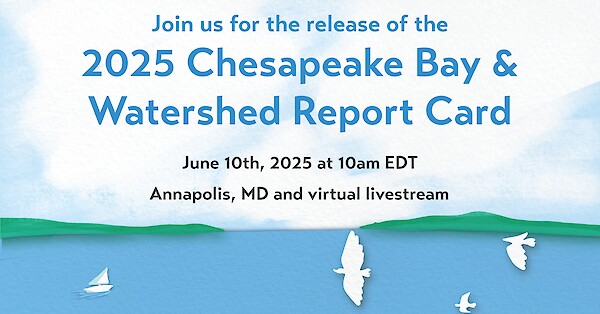
We're pleased to announce that the 2025 Chesapeake Bay & Watershed Report Card will be released on Tuesday, June 10th at 10am EDT! Please join us in person at the Annapolis Maritime Museum in Annapolis, MD or virtually through livestream to learn about the latest health status of the Bay and its Watershed! This year marks the 19th year we have released this report card and also the centennial celebration of UMCES, so we are excited to also unveil a special edition of the Chesapeake Bay Report Card along with our annual report card. We are also excited to release this report card during Chesapeake Bay Awareness Week 2025, which is being held from June 7–15 this year. If you would like to stay notified about the report card release, please click here to RSVP for the event.
Engaging community members at Nature Everywhere Week
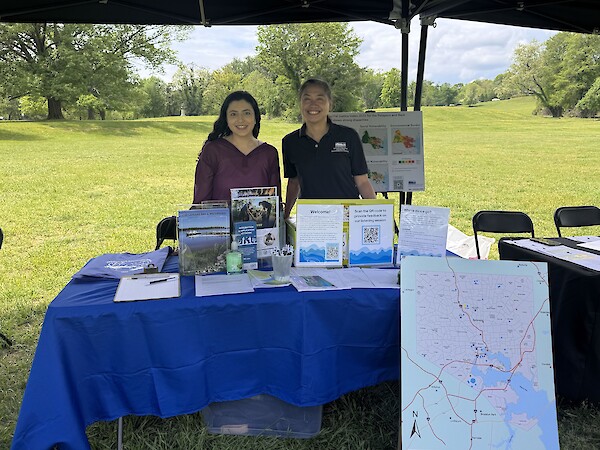
On May 1st, IAN hosted an interactive exhibit at the Nature Everywhere Week event at Druid Hill Park in Baltimore, MD. This was a week-long event aimed at fostering community participation with hands-on stewardship and promoting environmental literacy. Similar to previous listening sessions, our table featured activities meant to engage the community and understand their perspectives about the Chesapeake Bay and watershed. We also had kid-friendly activities that educated kids about the Chesapeake Bay and allowed them to express their creativity. Our continued engagement efforts are part of a broader initiative to improve our annual Chesapeake Bay and Watershed Report Card.
2025 Chesapeake Bay & Watershed Report Card
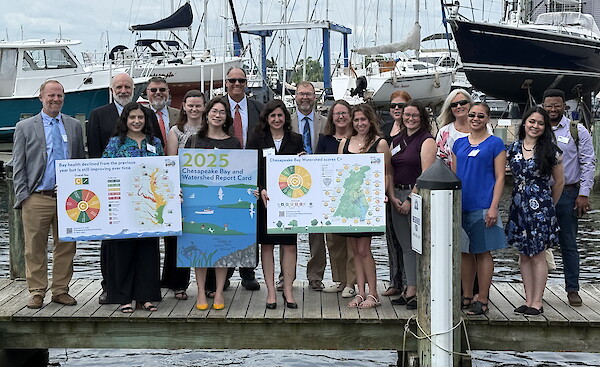
On Tuesday, June 10th, IAN released the 2025 Chesapeake Bay & Watershed Report Card at the Annapolis Maritime Museum. The release event program opened with a few words from UMCES President, Dr. Fernando Miralles-Wilhelm and featured comments from Secretary Josh Kurtz, Secretary Serena McIlwain, Senator Sara Love and virtually from Senator Chris Van Hollen and Representative Sarah Elfreth. The report card reveal was jointly presented by Drs. Bill Dennison and Heath Kelsey. To learn more about how the Bay and watershed scored this year, visit chesapeakebayreportcard.org. This year, we also released a special edition 1925 Chesapeake Bay Report Card to celebrate the UMCES Centennial and have both the 2025 and 1925 report cards available in Spanish for the first time!
The Rappahannock River Invasion: Catfish Cookout & Watershed Festival

Join us for the Rappahannock River Invasion: Catfish Cookout & Watershed Festival on Saturday, August 2nd! Indulge in delicious catfish dishes, enjoy live music, and learn about the importance of a healthy bay and fisheries. This event is perfect for families, friends, and anyone who loves good food and good company. Connect with regional partners and enjoy a day of fun while raising awareness about our waterways.
Highlights include:
- Tasty Food: Sample dishes made from invasive catfish and local fare.
- Live Entertainment: Enjoy performances by tribal bands and musicians.
- Interactive Activities: Water testing, nature walks, and tours.
- Educational Engagement: Learn about the impact of invasive species and sustainable fisheries.
Entrance is free—please register here! Food options for all dietary needs will be available. Buy meal tickets online in advance for $5 off or on-site the day of the event. Don't miss out on this exciting opportunity to celebrate our community and the Rappahannock River in all its glory!
Catfish cookout along the Rappahannock
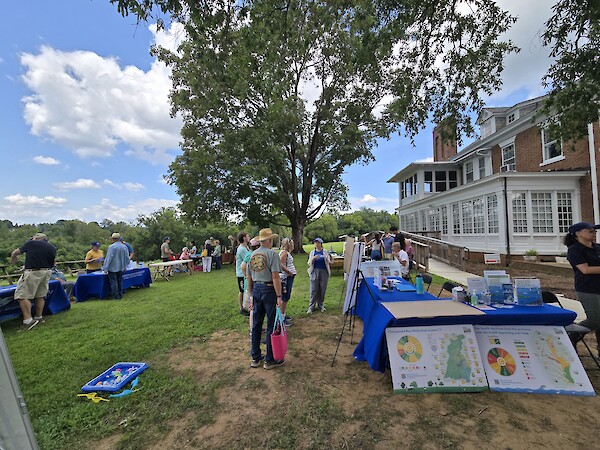
On August 2nd, the Rappahannock River Invasion: Catfish Cookout & Watershed Festival took place at the Patawomeck Museum & Cultural Center in Fredericksburg, VA. The Patawomeck Tribe of Virginia, IAN, and the Environmental Justice Journalism Initiative (EJJI) hosted the event. It also featured five regional partners who provided information and resources about their environmental intiatives. IAN's table offered its listening session approach that allowed for attendees to share their perspectives on considerations for improving the health status of the Chesapeake Bay and watershed. The highlight of the event was delicious blue catfish, and coupled with local music and beautiful weather, it made for a successful event. Situated adjacent to the Rappahannock River, the cookout brought awareness about invasive blue catfish and how their consumption can be an effective management initiative.
Celebrating Black maritime history on the Choptank River
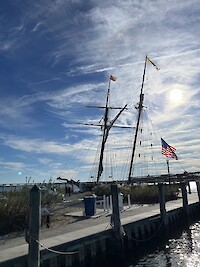
IAN participated in the first annual Sailing the Choptank Through Ebony Eyes in Cambridge, MD on October 25th. The event was organized by Alpha Genesis Community Development Corporation in collaboration with many local partners and was centered around sailing cruises on the Choptank River aboard the Pride of Baltimore II, along with tours of the Richardson Maritime Museum and boatbuilding demonstrations. This was a wonderful opportunity to celebrate the community and learn about the region’s rich Black maritime heritage. IAN shared recently completed projects about the health of the Bay and its watershed, as well as how prepared communities like the Pine Street community in Cambridge are for climate change. We are grateful to work with organizations like the Blacks of the Chesapeake Foundation and Harriet Tubman Tours, who help all people connect with their natural world while bringing history to life.
STAR Meeting: All About Indicators

On January 29th, the Scientific, Technical Assessment and Reporting (STAR) Team held their monthly meeting. The topic this month focused on the future of Chesapeake Bay Program indicators in the context of the revised Watershed Agreement and efforts to improve communication of progress towards Agreement goals. The meeting also featured speakers from UMCES IAN and Puget Sound Partnership to provide examples of how other organizations use and develop indicators. Alexandra Fries spoke about the evolution and expansion of the Chesapeake Bay and Watershed Report Card, the framework used for developing indicators, and the importance of tying together indicators into a compelling narrative. The meeting concluded with an open discussion about the different types of indicators and various approaches for the development of new indicators.